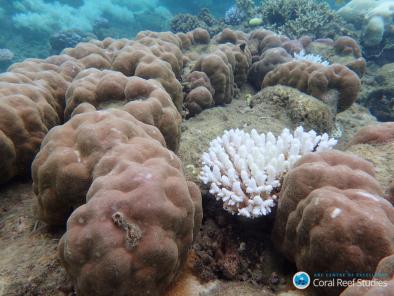Science Source
Reversal of ocean acidification enhances net coral reef calcification
- States that approximately one-quarter of the anthropogenic carbon dioxide released into the atmosphere each year is absorbed by the global oceans, causing measurable declines in surface ocean pH, carbonate ion concentration ([CO32−]), and saturation state of carbonate minerals (Ω)
- States that laboratory and field studies have shown that calcification rates of many organisms decrease with declining pH, [CO32−], and Ω
- States coral reefs are widely regarded as one of the most vulnerable marine ecosystems to ocean acidification, in part because the very architecture of the ecosystem is reliant on carbonate-secreting organisms, yet acidification-induced reductions in calcification are projected to shift coral reefs from a state of net accretion to one of net dissolution this century
- Quantifies the net calcification response of a coral reef flat to alkalinity enrichment, and show that, when ocean chemistry is restored closer to pre-industrial conditions, net community calcification increases
- Provides evidence that net community calcification is depressed compared with values expected for pre-industrial conditions, indicating that ocean acidification may already be impairing coral reef growth
Related Content
Headline

Apr 18, 2018 | Washington Post
Global warming has changed the Great Barrier Reef ‘forever,’ scientists say
Science Source
| World Weather Attribution
Great Barrier Reef Bleaching, March 2016
Science Source
| Proceedings of the National Academy of Sciences
Ocean acidification affects coral growth by reducing skeletal density
Nathaniel R. Mollica, Weifu Guo, Anne L. Cohen et al
Science Source
| PLOS ONE
Coral physiology and microbiome dynamics under combined warming and ocean acidification
Andréa G. Grottoli, Paula Dalcin Martins, Michael J. Wilkins et al


